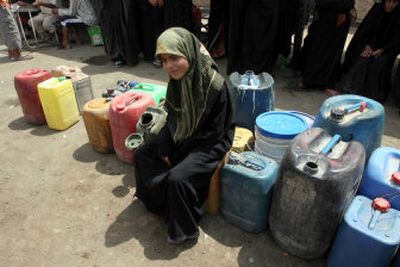Death squad suspects held, U.S. military says

BAGHDAD, Iraq – A roadside bomb killed a U.S. soldier north of Baghdad on Monday, and the American military announced the capture of two alleged death squad leaders as U.S. and Iraqi authorities step up efforts to stem rampant sectarian violence.
The two men accused of leading death squads were captured Sunday in southern Baghdad during simultaneous raids.
Both suspects “exercise control over all death squad cell activity” in the Sunni districts of Dora and Sahha and the predominantly Shiite Abu D’Shair in Baghdad, the military said in a statement.
A separate military statement said a U.S. soldier died Monday when the vehicle in which he was riding was struck by a roadside bomb.
The death came a day after two Marines and a sailor, assigned to the Regimental Combat Team 7, died fighting in the province of Anbar, the stronghold of the Sunni Arab insurgency west of Baghdad.
In other violence, a person was shot to death in the northern city of Mosul.
But Iraqis generally enjoyed a rare day of relative peace as they returned to Baghdad’s streets after a weekend vehicle ban during a Shiite religious commemoration that was disrupted by sniper attacks on pilgrims in another episode of sectarian bloodletting.
Prime Minister Nouri al-Maliki, a Shiite, thanked the armed forces for preventing major attacks. “We condemn strongly the terrorists attacks committed by the terrorists against innocent civilians,” he said in a statement.
“The success of the army and the security forces in preventing the terrorists from killing (a larger number of) innocent people – although some fell as martyrs – reflects the rising power of the armed forces,” he said.
Many people made special efforts to watch the televised opening of Saddam Hussein’s trial for the killings of tens of thousands of Kurds nearly two decades ago. Saddam kept up his defiance, refusing to enter a plea as his new trial opened – the second concerning alleged atrocities by his regime.
“I’m happy to see justice taking its course today,” said Haider Kadhim, 28, the owner of an electronics shop in Baghdad, a city that suffers from chronic power shortage.
Kadhim said he bought five gallons of gas for his generator to ensure electricity to watch the trial, which was broadcast on all local channels with a 20-minute delay to ensure that sensitive portions with security implications could be censored.
Also Monday, Oil Minister Hussain al-Shahristani said Iraq plans to build several new oil refineries and upgrade existing ones to start exporting gasoline and other byproducts by 2010. But he acknowledged that insurgent attacks on pipelines remain a serious problem.
Al-Shahristani said Iraq plans to increase the production of crude oil from about 2 million barrels per day to the prewar level of 3 million barrels per day by the end of the year. He did not elaborate.
The largest of the new refineries – to be located in central Iraq – will be completed by 2009 or 2010, al-Shahristani said during a meeting with members of the parliament’s economic committee.